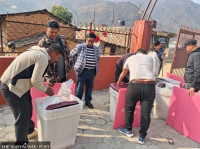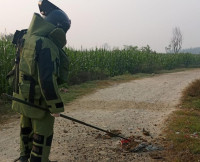National
Ideological differences in ruling party surface over ‘people’s war’
Top former Communist Party of Nepal-UML leaders, including Prime Minister KP Sharma Oli, on Wednesday skipped a programme the former Maoists observe on February 13 (Falgun 1) every year to commemorate their “people’s war”, in what carried a political message that ideological struggle between the two communist parties still persist and differences are yet to be fully resolved.
Anil Giri
Top former Communist Party of Nepal-UML leaders, including Prime Minister KP Sharma Oli, on Wednesday skipped a programme the former Maoists observe on February 13 (Falgun 1) every year to commemorate their “people’s war”, in what carried a political message that ideological struggle between the two communist parties still persist and differences are yet to be fully resolved.
Moreover, former UML leaders publicly said that marking “people’s war” day—or Janayuddha Diwas—was not the party’s decision and that the call was taken by Pushpa Kamal Dahal, co-chair of the Nepal Communist Party. They even objected to the idea of marking the day.
The UML and the Maoist party united in March last year to form the Nepal Communist Party.
Dahal, however, maintained that there was a unanimous decision that the party would observe Madan Bhandari memorial day and “people’s war” day.
“Some [leaders] have failed to understand the importance of people’s war,” said Dahal, while addressing the programme at the party headquarters in Dhumbarahi.
Two separate functions were organised on Wednesday to commemorate the decade-long “people’s war”—in Parisdanda and Dhumbharai.
Parisdanda used to be the headquarters of the former Maoists. The UML had shifted its headquarters to Dhumbarahi after the 2015 earthquake damaged its building in Balkhu.
Now, Dhumbarahi is the headquarters for the unified Nepal Communist Party, while Parisdanda houses various party departments.
A letter signed by Bishnu Poudel, general secretary of the Nepal Communist Party, invited leaders and cadres to attend the Dhumbarahi function “to pay tributes to the martyrs of second people’s movement and people’s war”.
The second people’s movement took place in 2006 that overthrew the monarchy. But the Maoists take pride in their “people’s war” which they claim led to Nepal’s transition to federal democratic republic from the monarchy.
Political analysts said these ideological differences were bound to surface.
“The two communist forces did not do enough brainstorming during the time of party merger on how to view people’s war,” Hari Roka, a political analyst who was in the first Constituent Assembly from the Maoist quota, told the Post. “Yes, ideological differences are apparent now.”
Until the UML and Maoists decided to join hands in October 2017—in the run up to the first elections under the new constitution promulgated in 2015—they were adversaries, baying for each other’s blood.
Oli, a long time Maoist baiter, always questioned the relevance of the war—which claimed nearly 16,000 lives—waged by the Maoists. Dahal and his Maoist party belittled the UML saying they were not “real communists”.
It was the second Constituent Assembly elections that put the Maoists on back foot, as the party which had emerged as the single largest party in the first Constituent Assembly elections in 2008 faced a drubbing and got relegated to the third position.
In the months leading up to constitution promulgation, Oli’s UML and Dahal’s Maoist party came closer.
A month after the promulgation of the constitution, Oli, backed by the Maoists, was elected the prime minister in October 2015.
But a year later, Oli and Dahal fell out with each other. The Maoists pulled out of the then Oli government in July 2016 to side with the Nepali Congress that backed Dahal to install him as the prime minister. The turns of events were evident that Dahal was ambivalent.
But a merger between the UML and the Maoists had given some semblance of direction as the top leaders of the two communist forces appeared to be on the same page—and Oli and Dahal claimed they as “co-pilots” would steer the unified party.
But as the Maoists marked their first “people’s war” day after the two parties’ merger, differences started to surface.
At a function in Janakpur, former prime minister and UML leader Madhav Kumar Nepal objected to the idea of marking the “people’s war” day. “It’s not the party decision, rather it is a decision of an individual,” said Nepal. “A decision taken by a single leader to celebrate janayudddha cannot be acceptable to the party.”
Oli, Nepal, Jhalanath Khanal, Bamdev Gautam and Ishwor Pokhrel were not present at the Dhumbarahi programme. The Parisdanda programme also saw only the Maoist leaders.
When Dahal was addressing the Dhumbarahi function, Oli was unveiling the Prime Minister Employment Programme at the City Hall.
“Falgun 1 now onwards will be marked as ‘rojgar diwas’ [employment day],” Oli said, while inaugurating the programme. He did not talk about “people’s war”.
A former Maoist leader questioned the government’s intent, saying that Oli could have postponed the inauguration of the employment programme to a later date. “But he refused to do so because former UML leaders are yet to fully recognise the decade-long janayuddha as a major turning point in Nepal’s history to bring about socio-political changes in the country,” said the leader who asked anonymity saying he did not want to create any problem to the party unification process.
Both Oli and Dahal, however, downplayed talk of any differences.
“So much of efforts are being made to create dispute in the Nepal Communist Party,” Oli said at the programme. “But that will fail.”
And Dahal, almost at the same time, said in Dhumbarahi that Oli was busy as the government was completing its one year soon. “I just came from Baluwatar. Earlier, he had agreed to attend the function, but he could not because he had more pressing matters to attend to.”
Dahal also said that some elements were not happy with the unity of the two parties and that they were trying to create a rift.
The Dhumbarahi programme was attended by other former UML leaders, including Subas Chandra Nembang, Bhim Rawal, Amrit Bohora and Yubaraj Gyawali.
Differences between Oli and Dahal surfaced recently—first triggered by the latter’s statement on Venezuela political crisis. Following a series of statements, Oli and Dahal were engaged in a war of words, providing fodder for observers.
Political analysts said “people’s war” is close to Maoists’ heart, while the former UML is still reluctant to own it.
“Maoists’ root is janayuddha, they want to keep its legacy very much intact, while UML leaders since the very beginning have been against this ideology and the modus operandi of janayuddha,” Roka told the Post. “It is up to the NCP leaders how they carry the political and ideological discourse forward—and look into and evaluate janayuddha. That will determine the unified party’s future course.”




 24.89°C Kathmandu
24.89°C Kathmandu















